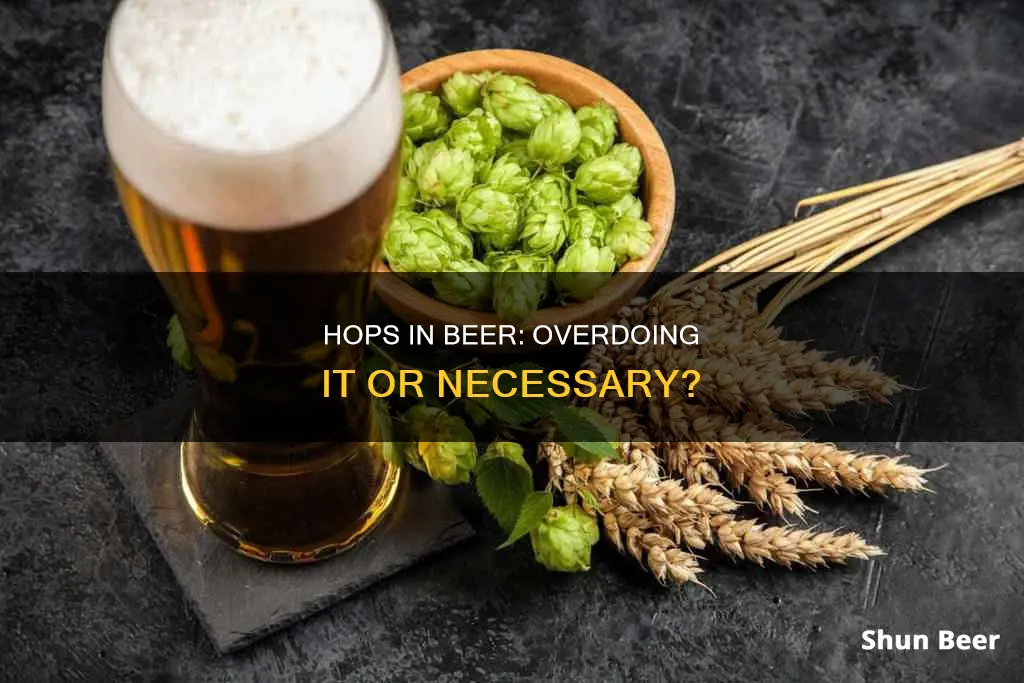
Hops are one of the four essential ingredients in beer, alongside barley, yeast, and water. They are the flowers of the female hops plant, Humulus lupulus, a cousin of the cannabis plant. Hops are used primarily as a bittering, flavouring, and stability agent in beer. They impart bitterness, floral, fruity, or citrus flavours and aromas to the beer. They also have antibacterial effects and act as preservatives, helping to balance the sweetness of the malt. While all beers use hops to some degree, the popularity of IPAs has led to many brewers increasing the amount of hops in their beers.
| Characteristics | Values |
|---|---|
| Reason for use | Flavour, balance sweetness with bitterness, preservative qualities |
| Flavour | Bitter, floral, fruity, citrus |
| Preservation method | Antibacterial effect, antibiotic properties |
| Alpha acids | Create bitter taste, soluble when boiled |
| Beta acids | Contribute to aroma |
| Aromatic oils | Destroyed in a long boiling process |
What You'll Learn

Hops balance the sweetness of malt with bitterness
Hops are added to beer to balance the sweetness of malt with bitterness. Before hops were used in beer, many types of herbs were added to balance out the sweetness of malt. The introduction of hops changed the flavour of beer forever. Hops not only add bitterness to balance the malt but also act as a natural preservative, increasing the shelf life of beer.
Hops are the flowers (also called seed cones or strobiles) of the hop plant Humulus lupulus, a member of the Cannabaceae family of flowering plants. They are used primarily as a bittering, flavouring, and stability agent in beer. Hops are also used for various purposes in other beverages and herbal medicine.
Hops contain alpha acids or humulones, which are responsible for the bitter taste of beer. During the wort boiling, the humulones are thermally isomerized into iso-alpha acids or isohumulones. The degree of bitterness imparted by hops depends on the degree to which alpha acids are isomerized during the boil. Hops with a high "alpha" are used as bittering hops. Alpha is an index of hop bitterness. The higher the alpha number, the greater the bitterness of the hop.
In addition to bitterness, hops also impart floral, fruity, or citrus flavours and aromas to beer. The hop flowers added to beer contain a large amount of leafy vegetative matter. The flavours associated with hops tend to be correspondingly plant-like. The particular flavours of hops vary with variety and growing region. Hop flavours and aromas tend to fall into one of seven broad categories: Floral, fruity, citrus, herbal, earthy, piney, and spicy.
Brewers may use different types of hops for bittering and aroma. Bittering hops have higher concentrations of alpha acids and are responsible for the bitter flavour of a beer. Aroma hops usually have a lower concentration of alpha acids and are the primary contributors of hop aroma and (non-bitter) flavour. Bittering hops are boiled for a longer period of time, typically 60-90 minutes, and often have inferior aromatic properties as the aromatic compounds evaporate during the boil. Aroma hops are typically added to the wort later to prevent the evaporation of the essential oils, to impart "hop taste" or "hop aroma".
Hop Butcher's Lactose: A Universal Addition?
You may want to see also

Hops are used for their antibacterial properties
Hops have been used in brewing for their antibacterial effect, which helps to prevent spoilage. They can inhibit the growth of undesirable microorganisms and balance the sweetness of the malt with bitterness. This antibacterial property of hops is especially useful in mixed-fermentation beers, where bacteria such as lactobacillus and pediococcus can cause souring.
The antibacterial properties of hops are due to the presence of bitter acids and flavonoids. These compounds can penetrate the bacterial cell wall and disrupt cellular function by preventing nutrient uptake, leading to cellular starvation and death. Hops are effective against Gram-positive bacteria, particularly Staphylococcus aureus, but some bacteria have genes that allow them to pump out the alpha acids, making them resistant to the antibacterial effects of hops.
The antibacterial activity of hops has been known for a long time, and it was one of the reasons why strongly hopped beers could survive the long shipping route from England to colonies in India, giving rise to the popular style of Indian Pale Ale.
The Unique Taste of Lagunitas Hops Beer
You may want to see also

Hops add flavour to beer
Hops are the flowers of the hop plant Humulus lupulus, a member of the Cannabaceae family of flowering plants. They are one of the four essential ingredients in beer, alongside barley, yeast, and water. Hops add flavour to beer in several ways.
Firstly, hops contribute a range of flavours to beer, including floral, fruity, citrus, herbal, and spicy notes. Different varieties of hops have distinct flavour profiles, which can be combined to create a unique taste for each type of beer. For example, Cascade hops, a widely used variety in American craft beer, are known for their floral, spicy, and citrusy flavour.
Secondly, hops are added to beer at different stages of the brewing process to impart specific flavours. They are typically added in three stages: bittering, flavouring, and aroma. The same hop variety can be used for all three stages. Adding hops at different times gives the beer more complexity. For instance, flavouring hops are added with 15 to 30 minutes remaining in the boil to impart a crisp, hoppy flavour without extracting much bitterness.
Thirdly, hops have antibacterial properties that help preserve the beer and prevent spoilage. This allows brewers to experiment with different combinations of hops and create a diverse range of beer styles.
Finally, hops help to stabilise the foam in beer, enhancing its appearance and overall quality.
Hopping in Beer: The Art of Aromatic Enhancement
You may want to see also

Hops are added to beer for their preservative qualities
The first documented use of hops in beer was in the 9th century, though they did not become common until later. Before hops, brewers used a "gruit" made from various bitter herbs and flowers, including dandelion, burdock root, marigold, horehound, ground ivy, and heather. Beers made with hops were noticed to be less prone to spoilage due to the antibacterial effects of hops, which suppress the growth of undesirable microorganisms.
Hops are added to the boil stage of brewing to unleash their "alpha" acids, which bitter and balance the sweetness of the malt. The degree of bitterness imparted by hops depends on the degree of alpha-acid isomerization during the boil. Hops also contribute to the overall flavour of the beer, with different varieties imparting unique flavour and aroma characteristics.
In addition to their preservative qualities, hops are used in beer for their ability to balance the sweetness of the malt with bitterness, as well as for their flavour and aroma contributions.
Choosing Hops for Beer: A Guide to Aromatic Excellence
You may want to see also

Hops are used to stabilise the finished product
Hops are an essential ingredient in beer, alongside barley, yeast, and water. They are the cone-shaped flowers of the female hops plant, or Humulus lupulus, a cousin of the cannabis plant. Hops are used to add bitterness, flavour, and stability to the finished beer.
The use of hops in beer dates back to the 9th century, although they did not become common until the Middle Ages and only became ubiquitous in recent centuries. Before hops, brewers used a gruit made from various bitter herbs and flowers, including dandelion, burdock root, and marigold. Beers made with hops were noticed to be less prone to spoilage due to hops' antibacterial effects, and so the traditional herb combinations were abandoned.
Hops are added to the boil stage of brewing, as it takes a long time (around an hour) to unleash the "alpha" acids that bitter and balance the sweetness of the malt. The degree of bitterness imparted by hops depends on the degree to which alpha acids are isomerized during the boil. Hops also contain beta acids or lupulones, which contribute desirable aromas to the beer.
In addition to their flavour and bitterness contributions, hops also act as a preservative, providing stability to the finished product. The acids in hops help to suppress bacterial growth, allowing brewer's yeast to grow and stabilising the foam qualities of the beer.
Hops and Hormones: The Estrogen-Beer Link Explained
You may want to see also
Frequently asked questions
Beers don't have too many hops. Hops are one of the four essential ingredients in beer (along with barley, yeast, and water). They are added to balance the sweetness of the malt with bitterness and a variety of flavours and aromas.
Hops contain alpha and beta acids that become part of the brew when boiled, giving it a bitter taste.
Hops contain a unique blend of oils that give them a strong aroma.







